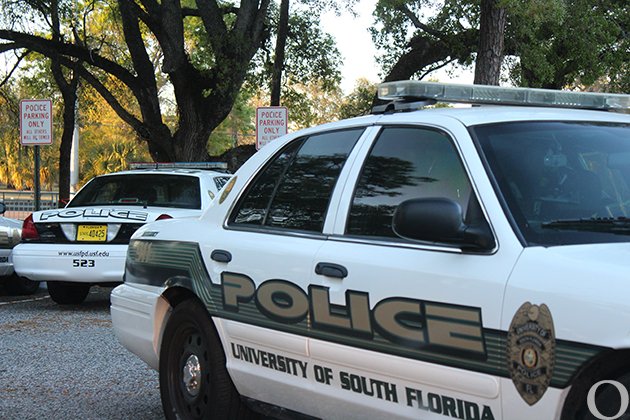UP to look for impaired drivers during Monday’s checkpoint

Late-night Monday drivers will experience a delay during their trips across campus as University Police (UP) conducts its Roadside Safety Checkpoint to identify impaired drivers in the area.
The checkpoint will take place Monday at 10 p.m. on Holly Drive, west of 50th Street. It will last an hour followed by a five-hour saturation patrol across campus. Around seven officers will be deployed at the checkpoints, according to Captain Martin King.
“The area does change since we have limited roads on campus, but historically, Hillsborough County is one of the higher impaired driving counties in the state of Florida, so we try to do our part and deter impaired driving and this is one way we’re able to do so,” he said.
Once vehicles enter the checkpoint, they will be stopped and drivers will need to show their driver’s license. Officers will potentially identify other violations, including an expired driver’s license or brake light out which could potentially lead to a traffic citation or a warning.
“We do a very brief and quick overall exterior safety check in the vehicle of any lights or equipment issues that it might have because, a lot of times, drivers don’t realize they’re driving around with maybe a brake light out because how often do you check stuff like that, so this is just a comprehensive approach to complete overall traffic safety,” King said.
Officers will then interact with the driver by asking questions, and if any signs of impairment are identified, further evaluation will be conducted.
Classic signs of impairment include noticing any visible alcohol or open containers inside the vehicle, the slurring of words by the driver when speaking with the officer as well as detecting the odor of alcohol or drugs from the driver or within the vehicle, according to King.
Any of these signs will lead officers to conduct a thorough evaluation of the driver’s level of impairment. The officer will request the driver to step out of the vehicle once it’s parked and conduct a brief interview, followed by a series of exercises to better gauge their alcohol content.
Exercises include walking nine steps down a line and back, and standing on one leg with their hands by their side for a period of time, according to King.
Based on those exercises, if the officer concludes the driver is too impaired to drive, they would be placed under arrest and transported to the Orient Road Jail in Hillsborough County while their vehicle would be towed from the scene.
“They would be held there for a minimum amount of time until the jail determines that they are no longer impaired,” King said. “At that point in time, they could post a bond to exit the jail, or they could remain in jail and unable to post bond until their first initial hearing.”
After the checkpoint ends at 11 p.m., the patrol will begin. Officers will be deployed around campus in their marked vehicles and “saturate” the area and surrounding jurisdiction looking for any signs of impaired drivers.
The initiative has been around for the past decade, according to King, but it was halted in 2020 because of safety issues related to the pandemic.
“Obviously, during the COVID pandemic, we had to pause the operation just due to the increased interaction with the drivers in order to mitigate any COVID exposure for the officers and also due to the fact that the population on campus was extremely limited [over] the last 18 months,” King said.
During the last safety checkpoint in fall 2019, around 13 vehicles were stopped and no arrests were made. King said the ultimate goal of the checkpoint, and announcing it in advance, is for drivers to make better and safer choices when on the road.
“We typically do not see a lot of impaired driving arrests in our checkpoints, which is kind of our goal because the key is to have people make better decisions prior to going out and having fun for the evening,” he said.
“By advertising these checkpoints in advance, we hope that it puts in their head maybe alternative solutions to driving impaired such as Uber or having a sober driver.”







